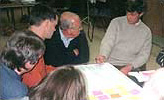Learning the Lessons - Sustainability
Sustainability | Strategic Approach | Participation | Partnership | Alignment | Capacity Building | Affordability | Transferability
‘Making wise use of our resources in order to build a viable community for the future’

Sustainability, the focus of our work, proved to be an elusive, challenging and complex concept to work with. It lacked clear definition, tended to mean ‘all things to all people’, and often masked important distinctions. This was even more the case because we were trying to work with so many diverse partners, from multiple local community interests to sectoral national agencies. Establishing any common understanding of ‘sustainability’ amongst these partners was an enormous challenge. It was also evident that, whilst a form of words could be found to define the concept, when it came to putting it into practice, differing world views tended to re-assert themselves.
Working with ‘sustainability’ as a framework also required discipline. This was not just any kind of development strategy; everything had to pass through the sustainability check. What form this check took and how it was applied was the subject of much debate and not a little frustration over the additional complexity and work it involved. Dùthchas did not have a clear model to follow; it was exploring new ground here.

Despite these challenges we found that sustainability, if carefully translated, provided a framework which people everywhere could relate to. It helps to focus on the things that are really valued and the ways in which these can be protected. It also allows us to identify the things that cause us problems in our everyday lives and find solutions to these. Finally, it encourages us to be aspirational and to envisage futures in which our visions for a better quality of life can be identified and worked towards.
We found that sustainability provides the foundation for adding value and delivering multiple benefits to any type of project. It also forces a more thoughtful and disciplined approach to planning local development. Planning for sustainability just has to be strategic, it cannot be piecemeal. Ultimately this was found to be one of the biggest strengths of our approach – adding value and minimising inappropriate developments.

Dùthchas took significant strides forward in helping our many partners to work with the notion of sustainability. We developed a working ‘discipline’ in the form of our Goals, Objectives, Indicators and Checklists. By applying this framework we discovered the capacity of local communities to identify and work with the ‘big’ sustainability issues in a strategic way. Many of these issues were new and ambitious - renewable energy, waste reduction, organic production, local processing and direct marketing, community transport, eco-designed housing, socio-economic benefits from protection, etc. We saw projects emerge that had added value through considering the dimensions of sustainability.
All in all, we recommend that others are not daunted by the challenges of sustainability and can promise that working with it will provide great rewards.
In summary, some of the key lessons of sustainability were that it enabled:
- added value in delivering multiple benefits from each project
- innovation in opening up new solutions to old problems
- exciting new opportunities for our communities
- involvement in bringing differing interests together around the table
- integration in providing a platform to link social, environmental and economic interests
- challenges to established practices and sectoral thinking